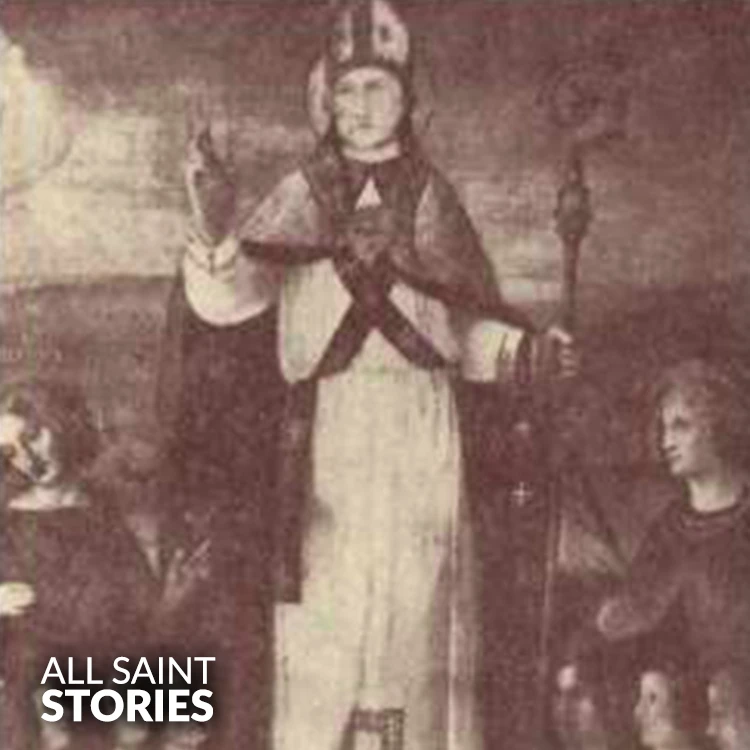"Saint Abundius, faithful servant of Christ, intercede for us with your unwavering devotion. Help us to embrace the virtues of patience, kindness, and courage, and guide us in following the path of holiness. May your example inspire us to live in love and faith. Pray for us, that we may find strength in God’s grace, now and always. Amen."
ST. ABUNDIUS OF COMO
ST. ABUNDIUS OF COMO

St. Abundius of Como was a 5th-century bishop who defended the Christian faith against heresies and represented Pope Leo I at the Council of Chalcedon. He played a vital role in the early Church in Italy.
St. Abundius of Como was born around the year 430, during a time when the Christian Church was solidifying its doctrines and confronting various theological disputes. Little is known about his early life, but his contributions as a bishop and theologian left a lasting impact on the Church, particularly in Northern Italy. He was appointed as the Bishop of Como, a city in Lombardy, and he served with notable energy and orthodoxy.
Abundius is best remembered for his unwavering defense of orthodox Christian doctrine during a time of significant heretical threats. He stood firmly against both Arianism, which denied the full divinity of Jesus Christ, and Eutychianism, which distorted the nature of Christ by denying His humanity. These heresies had created division within the Church and confusion among believers.
In 451, Pope Leo I selected Abundius to serve as his delegate to the Council of Chalcedon, one of the most important ecumenical councils in Christian history. There, Abundius helped affirm the dual nature of Christ—fully God and fully man—as defined in the Chalcedonian Creed. His contributions to the council were pivotal in shaping the orthodox Christological position that remains central to mainstream Christianity today.
Following his return to Italy, Abundius continued his pastoral duties, promoting the teachings of the Church and encouraging unity among the faithful. His leadership was marked by deep piety, theological clarity, and pastoral care. He passed away in 469, and his remains were buried in Como. Though not formally canonized through modern procedures, he has been venerated as a saint since the early centuries of the Church.
Video Not Found
The information on this website is compiled from various trusted sources. While we aim for accuracy, some details may be incomplete or contain discrepancies.
If you notice any errors or have additional information about this saint, please use the form on the left to share your suggestions. Your input helps us improve and maintain reliable content for everyone.
All submissions are reviewed carefully, and your personal details will remain confidential. Thank you for contributing to the accuracy and value of this resource.
Credits & Acknowledgments
- Anudina Visudhar (Malayalam) – Life of Saints for Everyday
by Msgr. Thomas Moothedan, M.A., D.D. - Saint Companions for Each Day
by A. J. M. Mausolfe & J. K. Mausolfe - US Catholic (Faith in Real Life) – Informational articles
- Wikipedia – General reference content and images
- Anastpaul.com – Saint images and reflections
- Pravachaka Sabdam (Malayalam) – Saint-related content and insights
We sincerely thank these authors and platforms for their valuable contributions. If we have unintentionally missed any attribution, please notify us, and we will make the correction promptly.
If you have any suggestion about ST. ABUNDIUS OF COMO
Your suggestion will help improve the information about this saint. Your details will not be disclosed anywhere.
© 2026 Copyright @ www.allsaintstories.com




 English
English
 Italian
Italian
 French
French
 Spanish
Spanish
 Malayalam
Malayalam
 Russian
Russian
 Korean
Korean
 Sinhala
Sinhala
 Japanese
Japanese
 Arabic
Arabic
 Portuguese
Portuguese
 Bantu
Bantu
 Greek
Greek
 German
German
 Dutch
Dutch
 Filipino
Filipino